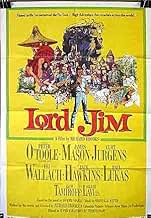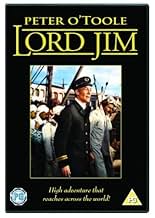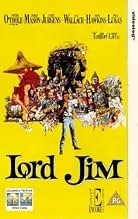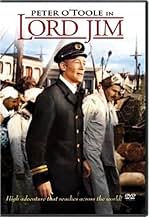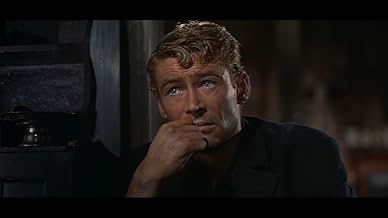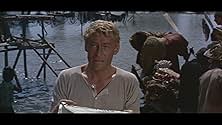Lord Jim
- 1965
- Tous publics
- 2h 34min
NOTE IMDb
6,7/10
4,4 k
MA NOTE
Après avoir été discrédité en tant que lâche, un marin du 19ème siècle ne vit que dans un seul but: se racheter.Après avoir été discrédité en tant que lâche, un marin du 19ème siècle ne vit que dans un seul but: se racheter.Après avoir été discrédité en tant que lâche, un marin du 19ème siècle ne vit que dans un seul but: se racheter.
- Réalisation
- Scénario
- Casting principal
- Nomination aux 2 BAFTA Awards
- 2 nominations au total
Curd Jürgens
- Cornelius
- (as Curt Jurgens)
Jûzô Itami
- Waris
- (as Ichizo Itami)
Rafiq Anwar
- Moslem Leader
- (as Rafik Anwar)
Avis à la une
Exciting and brooding picture based on the complex novel written by Joseph Conrad (who also wrote Darkness heart) and brought to the screen in lavish budget and colorful visual style .After being discredited as a coward, a 19th century seaman (Peter O'Toole) in British Merchant Marine lives for only one purpose : to redeem himself. As he suffers a deep scar and pain for the rest of his life . But then , he becomes leader of a Southeast Asia village in spite of his past clouded by allegations of betrayal and cowardice . Meanwhile , the native villagers are being slavered by a group nasty cutthroats led European thugs (Eli Wallach , Curt Jurgens) . As the belief shown in him by the villagers is put to the test .
This is a thought-provoking and intelligent story based on Joseph Conrad's novel written in 1900. This prestigious novel has been simplified for easier compression , appreciation and nicely developing . This adventure flick contains , thrills , action , intrigue and wonderful outdoors . Excellent acting by Peter O'Toole in the title role , he is a sailor in Souteast Asia who is adopted by a suppressed village as its leader . After the film's tepid reception, especially for his own starring performance, a once-enthusiastic Peter O'Toole declared, 'It was a mistake and I made the mistake because I was conservative and played safe and that way lies failure'. Movie's biggest moments provided by strange acting by the great Peter O'Toole . Supporting cast is frankly sensational such as Curd Jürgens , Eli Wallach , Jack Hawkins , Paul Lukas , Daliah Lavi , Akim Tamiroff , Andrew Keir , Jack MacGowran ,Ric Young , Noel Purcel , Walter Gotell , among others .Evocative and exotic cinematography by Freddie Young , shot on location in Malacca, Malaysia Lantau Island, Hong Kong, China and Angkor Wat, Siem Reap, Cambodia. Although the Cambodian government never demanded any script approval, one condition of its agreement to allow on-location shooting in the troubled nation was for the production company to build a lot of rooms addition to an existing hotel near the famed Angkor ruins .
Directed and screen-played with awesome style by Richard Brooks . He was a fine writer/director so consistently mixed the good and average which it became impossible to know that to expect from him next . Firstly he worked regularly as a Hollywood screenwriter . After that , his initial experience of directing was one of his own screenplays called ¨Crisis¨. The Richard Brooks films that have the greatest impact are realized during the 50s and 60s as ¨Cat on a hot tin roof¨, ¨Something of value¨ , ¨Elmer Gantry¨, ¨Sweet bird of youth¨, ¨In cold blood¨ , ¨Lord Jim¨. Brooks was a writer and director of Chekhovian depth , who mastered the use of understatement, anticlimax and implied emotion . His films enjoyed lasting appeal and tended to be more serious than the usual mainstream productions . Richards formerly directed two good Western titled ¨Bite the bullet¨ and ¨The professionals ¨ with various tough stars as Burt Lancaster , Lee Marvin , Jack Palance and Robert Ryan , including the same musician , Alex North , and similar outdoors . The ¨Lord Jim¨ is an authentic must see , not to be missed for buffs of the genre . A magnificent movie , hardly noticed for its theatrical release ; however , being nowadays very well considered . Rating : Above average because of its awesome acting , dialog , score are world class.
This is a thought-provoking and intelligent story based on Joseph Conrad's novel written in 1900. This prestigious novel has been simplified for easier compression , appreciation and nicely developing . This adventure flick contains , thrills , action , intrigue and wonderful outdoors . Excellent acting by Peter O'Toole in the title role , he is a sailor in Souteast Asia who is adopted by a suppressed village as its leader . After the film's tepid reception, especially for his own starring performance, a once-enthusiastic Peter O'Toole declared, 'It was a mistake and I made the mistake because I was conservative and played safe and that way lies failure'. Movie's biggest moments provided by strange acting by the great Peter O'Toole . Supporting cast is frankly sensational such as Curd Jürgens , Eli Wallach , Jack Hawkins , Paul Lukas , Daliah Lavi , Akim Tamiroff , Andrew Keir , Jack MacGowran ,Ric Young , Noel Purcel , Walter Gotell , among others .Evocative and exotic cinematography by Freddie Young , shot on location in Malacca, Malaysia Lantau Island, Hong Kong, China and Angkor Wat, Siem Reap, Cambodia. Although the Cambodian government never demanded any script approval, one condition of its agreement to allow on-location shooting in the troubled nation was for the production company to build a lot of rooms addition to an existing hotel near the famed Angkor ruins .
Directed and screen-played with awesome style by Richard Brooks . He was a fine writer/director so consistently mixed the good and average which it became impossible to know that to expect from him next . Firstly he worked regularly as a Hollywood screenwriter . After that , his initial experience of directing was one of his own screenplays called ¨Crisis¨. The Richard Brooks films that have the greatest impact are realized during the 50s and 60s as ¨Cat on a hot tin roof¨, ¨Something of value¨ , ¨Elmer Gantry¨, ¨Sweet bird of youth¨, ¨In cold blood¨ , ¨Lord Jim¨. Brooks was a writer and director of Chekhovian depth , who mastered the use of understatement, anticlimax and implied emotion . His films enjoyed lasting appeal and tended to be more serious than the usual mainstream productions . Richards formerly directed two good Western titled ¨Bite the bullet¨ and ¨The professionals ¨ with various tough stars as Burt Lancaster , Lee Marvin , Jack Palance and Robert Ryan , including the same musician , Alex North , and similar outdoors . The ¨Lord Jim¨ is an authentic must see , not to be missed for buffs of the genre . A magnificent movie , hardly noticed for its theatrical release ; however , being nowadays very well considered . Rating : Above average because of its awesome acting , dialog , score are world class.
Based on the novel, this movie is not only representative of the period piece that Joseph Conrad's story was, but also of movie-making at that time (1965). It's an epic story told in the way that they did back then --sweeping landscapes, exotic locales, hundreds of extras, good performances and many questions regarding philosophical and practical values. At times a bit clunky and unexplained, the movie is a study in movie-making during that era.
It brings up the same issues that Conrad did in his book, sometimes so much so that the dialog feels as though it is dragging. O'Toole's character emotes plenty, despite acting flat for a good portion of the first third. The scene between him and James Mason is the spark of the piece. At 2:34, this movie flounders and drags in the middle. Still, it's a good piece to watch.
It brings up the same issues that Conrad did in his book, sometimes so much so that the dialog feels as though it is dragging. O'Toole's character emotes plenty, despite acting flat for a good portion of the first third. The scene between him and James Mason is the spark of the piece. At 2:34, this movie flounders and drags in the middle. Still, it's a good piece to watch.
I have seen the film three times over the past thirty years and each time I loved it. The subject of the film must have attracted director Richard Brooks who was essentially a screenplay writer who later became a director. He knew the merits of a strong script with philosophical lines from Conrad. Coppola was to use the related original material (Conrad's) in his "Apocalypse Now" for the Brando scenes several decades after this film was made and mostly forgotten.
What Brooks does not realize is that lines like "it only takes a split second to make a coward a hero or turn a hero into a coward" and "every sinner wants a second chance at redemption, without realizing he is damned for ever" are philosophical lines that one expects to hear from very literate individuals. Here, in "Lord Jim," the lines are often spoken by the dregs of society. Jim, of course, we are told by the narrator (Jack Hawkins' Marlowe) was philosophical, dreamed of heroism, and was a gentleman.
The film is made up of three distinct segments: 1. the "sinking" of SS Patna 2. The liberation of Patusan ("Patna" + "us" make up the name Patusan, remarks Jim to his love) and 3. The battle with a group of scoundrels (led by James Mason's 'Gentleman' Brown) with some fine speeches on honor, death, and fear.
Each segment could stand alone but together the film adds considerable worthiness that exceeds the action and plot, the elements that most viewers use to judge a movie. The lesser characters in the film add color and counterpoints to the script. Christian Marquand's French Captain who defends Jim's "cowardice" with the words "fear can make us do strange things" or Paul Lukas' Stern who compares his dead butterfly collection with the "wonderful, perfect human beings that God created" or the native who wonders why some pray to one god instead of a host of Gods are a few examples of dialogs that force you to reflect on what you heard.
The film's subject covers several religions. The fervent Muslims on the way to Haj survive the storm. The Christian Jim prays to his God. The Buddhists pray to Buddha. And the natives pray to their array of gods (a touch of Hinduism?). Yet, the film is not a religious film. But faith in God is underlined at every stage.
Conrad was Polish and a seaman before he became a writer. Brooks is an American. O'Toole leads a cast that is predominantly British. Daliah Lavi is Israeli, Marquand is French, Jurgens is German...The film is truly international.
Brooks not only wrote and directed the film but this was the first film that he produced. The film proved to be ideal for O'Toole reprising his roles of "Lawrence of Arabia" and "Becket", roles that draw thin lines between cowardice and heroism and consequent attempts to redeem oneself. The film is not great cinema--but will remain for me cinema based on related major literary works ("Lord Jim" and "Heart of Darkness", both narrated by the fictional Marlow) adapted for the screen with some delightful performances from O'Toole, Mason, Wallach, and Marquand and commendable photography by Freddie Young.
What Brooks does not realize is that lines like "it only takes a split second to make a coward a hero or turn a hero into a coward" and "every sinner wants a second chance at redemption, without realizing he is damned for ever" are philosophical lines that one expects to hear from very literate individuals. Here, in "Lord Jim," the lines are often spoken by the dregs of society. Jim, of course, we are told by the narrator (Jack Hawkins' Marlowe) was philosophical, dreamed of heroism, and was a gentleman.
The film is made up of three distinct segments: 1. the "sinking" of SS Patna 2. The liberation of Patusan ("Patna" + "us" make up the name Patusan, remarks Jim to his love) and 3. The battle with a group of scoundrels (led by James Mason's 'Gentleman' Brown) with some fine speeches on honor, death, and fear.
Each segment could stand alone but together the film adds considerable worthiness that exceeds the action and plot, the elements that most viewers use to judge a movie. The lesser characters in the film add color and counterpoints to the script. Christian Marquand's French Captain who defends Jim's "cowardice" with the words "fear can make us do strange things" or Paul Lukas' Stern who compares his dead butterfly collection with the "wonderful, perfect human beings that God created" or the native who wonders why some pray to one god instead of a host of Gods are a few examples of dialogs that force you to reflect on what you heard.
The film's subject covers several religions. The fervent Muslims on the way to Haj survive the storm. The Christian Jim prays to his God. The Buddhists pray to Buddha. And the natives pray to their array of gods (a touch of Hinduism?). Yet, the film is not a religious film. But faith in God is underlined at every stage.
Conrad was Polish and a seaman before he became a writer. Brooks is an American. O'Toole leads a cast that is predominantly British. Daliah Lavi is Israeli, Marquand is French, Jurgens is German...The film is truly international.
Brooks not only wrote and directed the film but this was the first film that he produced. The film proved to be ideal for O'Toole reprising his roles of "Lawrence of Arabia" and "Becket", roles that draw thin lines between cowardice and heroism and consequent attempts to redeem oneself. The film is not great cinema--but will remain for me cinema based on related major literary works ("Lord Jim" and "Heart of Darkness", both narrated by the fictional Marlow) adapted for the screen with some delightful performances from O'Toole, Mason, Wallach, and Marquand and commendable photography by Freddie Young.
It is sometime in the late 19th century, and Jim is an up-and-coming merchant seaman. After rising through the ranks under Captain Marlowe, Jim is injured and stranded in Java. After recovering, he signs on with the first available ship: the SS Patna, bound for Mecca with hundreds of pilgrims. During a storm, the crew abandon it, thinking it will surely sink, and in a moment of weakness; Jim joins them. Back in port, they realise the ship was saved, and Jim's guilt impels him to turn himself in. After a public humiliation at an official inquiry, Jim becomes a drifter in the Asiatic waters; determined to one day restore honour to his good name.
Written and directed by Richard Brooks- and based on Joseph Conrad's novel of the same name- 'Lord Jim' is a grandly photographed adventure that is enjoyable, though doesn't live up to its source material. Despite Brooks' best efforts, he fails to recapture the psychological intrigue and headily atmospheric nature of the novel. His version of the story is more of a straight adventure piece, missing the subtle, profound examinations of guilt and honour that made up the dark heart of Conrad's tale.
This is not to say the film isn't worthwhile, however. Though it culminates with a dull battle sequence, and the pacing is sluggish in places, 'Lord Jim' still engages and entertains. Brooks' dialogue and characterisation is strong, while the portrayal of the colonial attitudes of the time is striking and powerful. Despite the fact that his handling of the novel's themes feels lightweight, the central message about redemption and dignity still comes across; albeit a little watered down.
Furthermore, Freddie Young's immersive colour cinematography gives the film a crisp look and an epic feel. He successfully captures the contrast between the different settings of the film, from the bustling port of Java to the exotic, remote village of Patusan. His utilisation of various camera angles and movements creates dynamic, dramatic scenes, whether it be the stormy night on the Patna, the tense trial of Jim, or the final showdown. Young's consummate work enhances the mood and tone of the film, making it a visually stunning spectacle.
Conversely, Alan Osbiston's ponderous editing lends proceedings a sluggish pace, which is most evident in the latter half of the film. Though just under two and a half hours, 'Lord Jim' feels more protracted than it should have. On the other hand, Bronislaw Kaper's score is atmospheric and stirring, giving life to even the most lethargic of scenes, complementing the fine work of the aforementioned Young.
Also worthy of praise is the cast, led by a pitch-perfect Peter O'Toole. There were- and still are- few actors who could inject the same degree of intensity into their performances as O'Toole did, time and time again. As Jim, he enthralls with his obsessive desire to clear his name of dishonour, and his co-stars prove to be equally impressive. Eli Wallach does typically fine work as the villainous warlord The General, while Curd Jürgens steals every scene he's in as the duplicitous, drunken Cornelious. Moreover, James Mason's turn as the oily, cut-throat bandit Gentleman Brown may make your skin actually crawl; and is the main highlight of the uneven latter half.
In conclusion, Richard Brooks' adaptation of Joseph Conrad's 'Lord Jim' is a mixed-bag if ever there was one. Though Conrad's fascinating tale of guilt, honour and redemption is slightly truncated, it is not totally lost in translation; and the film still packs a narrative punch. Freddie Young's cinematography is captivating, while Bronislaw Kaper's score is stirring and the performances are of a particularly high quality- especially that of star Peter O'Toole. At the end of the day, though it goes through some choppy waters, 'Lord Jim' is still a cruise you should embark on.
Written and directed by Richard Brooks- and based on Joseph Conrad's novel of the same name- 'Lord Jim' is a grandly photographed adventure that is enjoyable, though doesn't live up to its source material. Despite Brooks' best efforts, he fails to recapture the psychological intrigue and headily atmospheric nature of the novel. His version of the story is more of a straight adventure piece, missing the subtle, profound examinations of guilt and honour that made up the dark heart of Conrad's tale.
This is not to say the film isn't worthwhile, however. Though it culminates with a dull battle sequence, and the pacing is sluggish in places, 'Lord Jim' still engages and entertains. Brooks' dialogue and characterisation is strong, while the portrayal of the colonial attitudes of the time is striking and powerful. Despite the fact that his handling of the novel's themes feels lightweight, the central message about redemption and dignity still comes across; albeit a little watered down.
Furthermore, Freddie Young's immersive colour cinematography gives the film a crisp look and an epic feel. He successfully captures the contrast between the different settings of the film, from the bustling port of Java to the exotic, remote village of Patusan. His utilisation of various camera angles and movements creates dynamic, dramatic scenes, whether it be the stormy night on the Patna, the tense trial of Jim, or the final showdown. Young's consummate work enhances the mood and tone of the film, making it a visually stunning spectacle.
Conversely, Alan Osbiston's ponderous editing lends proceedings a sluggish pace, which is most evident in the latter half of the film. Though just under two and a half hours, 'Lord Jim' feels more protracted than it should have. On the other hand, Bronislaw Kaper's score is atmospheric and stirring, giving life to even the most lethargic of scenes, complementing the fine work of the aforementioned Young.
Also worthy of praise is the cast, led by a pitch-perfect Peter O'Toole. There were- and still are- few actors who could inject the same degree of intensity into their performances as O'Toole did, time and time again. As Jim, he enthralls with his obsessive desire to clear his name of dishonour, and his co-stars prove to be equally impressive. Eli Wallach does typically fine work as the villainous warlord The General, while Curd Jürgens steals every scene he's in as the duplicitous, drunken Cornelious. Moreover, James Mason's turn as the oily, cut-throat bandit Gentleman Brown may make your skin actually crawl; and is the main highlight of the uneven latter half.
In conclusion, Richard Brooks' adaptation of Joseph Conrad's 'Lord Jim' is a mixed-bag if ever there was one. Though Conrad's fascinating tale of guilt, honour and redemption is slightly truncated, it is not totally lost in translation; and the film still packs a narrative punch. Freddie Young's cinematography is captivating, while Bronislaw Kaper's score is stirring and the performances are of a particularly high quality- especially that of star Peter O'Toole. At the end of the day, though it goes through some choppy waters, 'Lord Jim' is still a cruise you should embark on.
Moving story of an idealistic seaman forced to deal with his act of cowardice and how he ultimately redeems himself. The film has good action sequences and a moving love story. Performances by Eli Wallach and James Mason are colorful and solid, and there are plenty of Peter O'Toole's trademark "vacant stares". Daliah Lavi is gorgeous and her role more substantive than those of her other films. I love Peter O'Toole's films from this period (Lawrence of Arabia, What's New Pussycat?, Night of the Generals) and this one is as good as most of them. I looked for this film on DVD and finally had to tape it off of AMC (in the good old days before they saturated their programing with commercials). I'd like to see it restored and re-released.
Le saviez-vous
- AnecdotesThe crew and cast were joined by Cambodian translator Dith Pran, who was a liaison between Cambodians and the filmmakers and stars. He left the country after the 1975 Communist takeover and his own imprisonment, and his story was told in La déchirure (1984).
- GaffesWhen Jim is going up river, one of his companions throws a knife into another's back, but the knife is already in his back as he turns to warn Jim.
- ConnexionsFeatured in Où est passée mon idole? (1982)
Meilleurs choix
Connectez-vous pour évaluer et suivre la liste de favoris afin de recevoir des recommandations personnalisées
Détails
- Durée2 heures 34 minutes
- Rapport de forme
- 2.20 : 1
Contribuer à cette page
Suggérer une modification ou ajouter du contenu manquant




